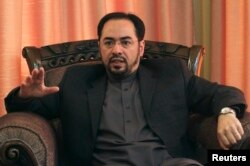Afghanistan’s Taliban disputes media reports that its representatives recently visited neighboring Pakistan and discussed with officials there the prospect of holding direct peace talks with Kabul.
The Taliban have long refused to hold direct talks with the Afghan government, calling it a “puppet” of the United States.
“We strongly reject [the media reports] because none of our leaders has traveled to Islamabad, nor has he met with any official there,” Zabihullah Mujahid, the insurgency’s main spokesman, told VOA Friday.
But he did not outright deny reports his group may attend a Moscow meeting, if invited.
“When an invitation is extended to us, only then we can consider it and comment on it,” Mujahid said.
Reports of Pakistan meeting
He spoke a day after an Associated Press report said Pakistani officials hosted seven Taliban leaders in Islamabad in their bid to press the insurgents to return to peace talks with the Afghan government.
Pakistan brokered and hosted a single meeting between Taliban and Afghan officials in July 2015, but the revelation at the time that the insurgent group's supreme leader, Mullah Omar, had been dead for two years disrupted the peace process.
A senior Pakistani government official and an intelligence official told VOA they were unaware of any such “visit or talks.” Both officials requested anonymity because they are not authorized to speak publicly on such matters.
“Pakistan is trying to distance itself from hosting Afghan peace talks and would instead prefer they are held in a country acceptable to all the parties,” the intelligence official maintained.
Relations between Islamabad and Kabul have deteriorated in recent years because of Taliban-led attacks in Afghanistan, for which Afghan officials blame insurgent sanctuaries on Pakistani soil.
Afghanistan open to talks
Speaking in Washington earlier this week, Afghan Foreign Minister Salahuddin Rabbani insisted Kabul has kept the doors for peace negotiations open to insurgents, but accused Islamabad of hindering efforts to find a peaceful solution to the conflict in his country.
“Pakistan’s reluctance to end its support for terrorism underpins the continuation of violence in Afghanistan and the region. … A paradigm shift in Pakistan is needed if any progress is to be made in peace efforts with the Taliban,” Rabbani said.
Russia to host talks, US says no
Russia also has recently stepped in to try to promote Afghan peace and reconciliation efforts through a multinational dialogue.
Moscow plans to host another round of the discussions next month with officials from Afghanistan, Pakistan, India, Iran and China to further the process. The United States was also among the invitees, along with several Central Asian nations.
But Washington has reportedly turned down the invitation to the April 14 conference. The United States was not consulted before receiving the invitation and does not know Russia’s objectives for the gathering, the Associated Press said Thursday, quoting a State Department official who spoke on the condition of anonymity.
Separately, a top U.S. military commander told a Senate Armed Services Committee hearing Thursday that Russia may be supplying the Taliban as they battle U.S.-led international forces in Afghanistan.
But U.S. Army General Curtis Scaparrotti, NATO’s Supreme Commander, did not elaborate on what kinds of supplies might by provided or how direct Russia’s involvement could be.





